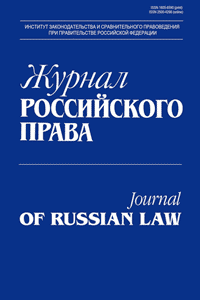Over the last decades corruption was taking on a huge scale to become the most dangerous phenomenon in the world community and has made such crime transnational. However, there is no generally accepted definition of a corruption corpus delicti. The difficulty is that corruption manifests itself in various forms. International legal acts in general define such crime as transnational corpus delicti of corruption. Such definition includes: bribery (active and passive) of public officials, abuse of influence for corruption purposes, illegal enrichment, money laundering, particular forms of making obstacles for justice, introduction of criminal liability for legal entities. Universal human environment can be achieved through implementation of internationally accepted standards in national legislations. This article deals with implementation of the relevant international anti-corruption rules into the Russian Criminal Code, it also draws attention to those international rules which should be included into the Criminal Code to make anti-corruption actions successful. The article justifies amendments to the Russian Criminal Code relating to illegal enrichment, it extends the definition of bribery to include non-material benefits. The issue of re-introduction of the confiscation of property as a separate type of punishment has been raised more than once. Criminal liability for legal entities should make an issue. By way of concluding, the author suggests the framework definition of the corpus delicti of corruption as an international crime.
Corruption, anti-corruption actions, implementation, international legal act, transnational crime, crime of corruption nature, bribe, active bribe, passive bribe, illegal advantage, illegal enrichment, commercial bribe, money laundering, criminal liability of legal entities, confiscation of property, corpus delicti of a corruption crime.
1. Adel´khanyan R. A. Prestupnost´ deyaniya po mezhdunarodnomu ugolovnomu pravu: ucheb. posobie. M., 2002.
2. Bogdanov E. V. Problemy ugolovnoy otvetstvennosti yuridicheskikh lits. Dostup iz SPS «Konsul´tantPlyus».
3. Vlasov I. S., Golovanova N. A., Kubantsev S. V. i dr. Ugolovnoe zakonodatel´stvo zarubezhnykh gosudarstv v bor´be s korruptsiey / pod red. I. S. Vlasova. M., 2009.
4. Dodonov V. N. Vliyanie mezhdunarodnogo prava na natsional´noe ugolovnoe zakonodatel´stvo. Mezhdunarodnoe pravo i natsional´noe zakonodatel´stvo: monografiya. M., 2009.
5. Karpets I. I. Prestupleniya mezhdunarodnogo kharaktera. M., 1979.
6. Kashepov V. P., Koshaeva T. O. Kriminalizatsiya - instrument ugolovno-pravovogo vozdeystviya na korruptsionnuyu prestupnost´. Korruptsiya. Priroda. Proyavleniya. Protivodeystvie: monografiya / otv. red. T. Ya. Khabrieva. M., 2012.
7. Kelina S. G. Otvetstvennost´ yuridicheskikh lits v proekte novogo Ugolovnogo kodeksa RF. Ugolovnoe pravo: novye idei. M., 1994.
8. Koshaeva T. O. Korruptsiya i zakon: perspektivy protivodeystviya. Ufa, 2013.
9. Kurs ugolovnogo prava. T. 5: Osobennaya chast´ / pod red. G. N. Borzenkova, V. S. Komissarova. M., 2007.
10. Kushnirenko S., Zotochkin A. Ob implementatsii v natsional´noe zakonodatel´stvo Rossii mezhdunarodnykh pravovykh norm, napravlennykh na usilenie bor´by s korruptsiey. Ugolovnoe pravo. 2006. № 6.
11. Lukashuk I. I., Naumov A. V. Mezhdunarodnoe ugolovnoe pravo. M., 1999.
12. Maksimov S. V. Korruptsiya, zakon, otvetstvennost´. M., 2008.
13. Miroshnichenko D. V. Ugolovno-pravovoe vozdeystvie na korruptsiyu. M., 2010.
14. Naumov A. V. O sootnoshenii norm mezhdunarodnogo i ugolovnogo prava. Sovetskaya yustitsiya. 1993. № 19.
15. Pravovye mekhanizmy implementatsii antikorruptsionnykh konventsiy: monografiya / otv. red. O. I. Tiunov. M., 2012.
16. Ugolovno-pravovoe vozdeystvie / pod red. A. I. Raroga. M., 2012.
17. Fedorov A. V. Ugolovnaya otvetstvennost´ yuridicheskikh lits za korruptsionnye prestupleniya. Zhurnal rossiyskogo prava. 2015. № 1.








